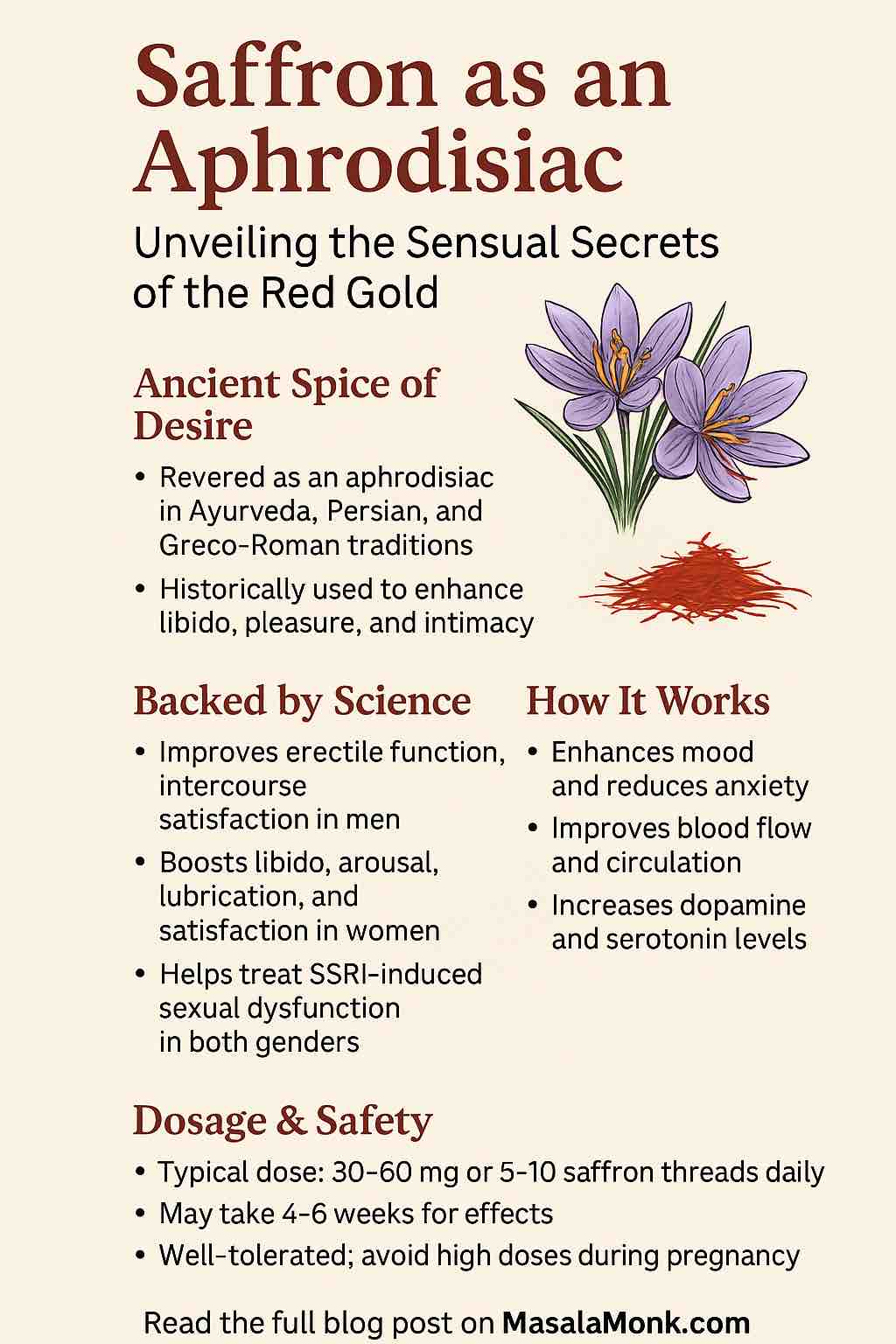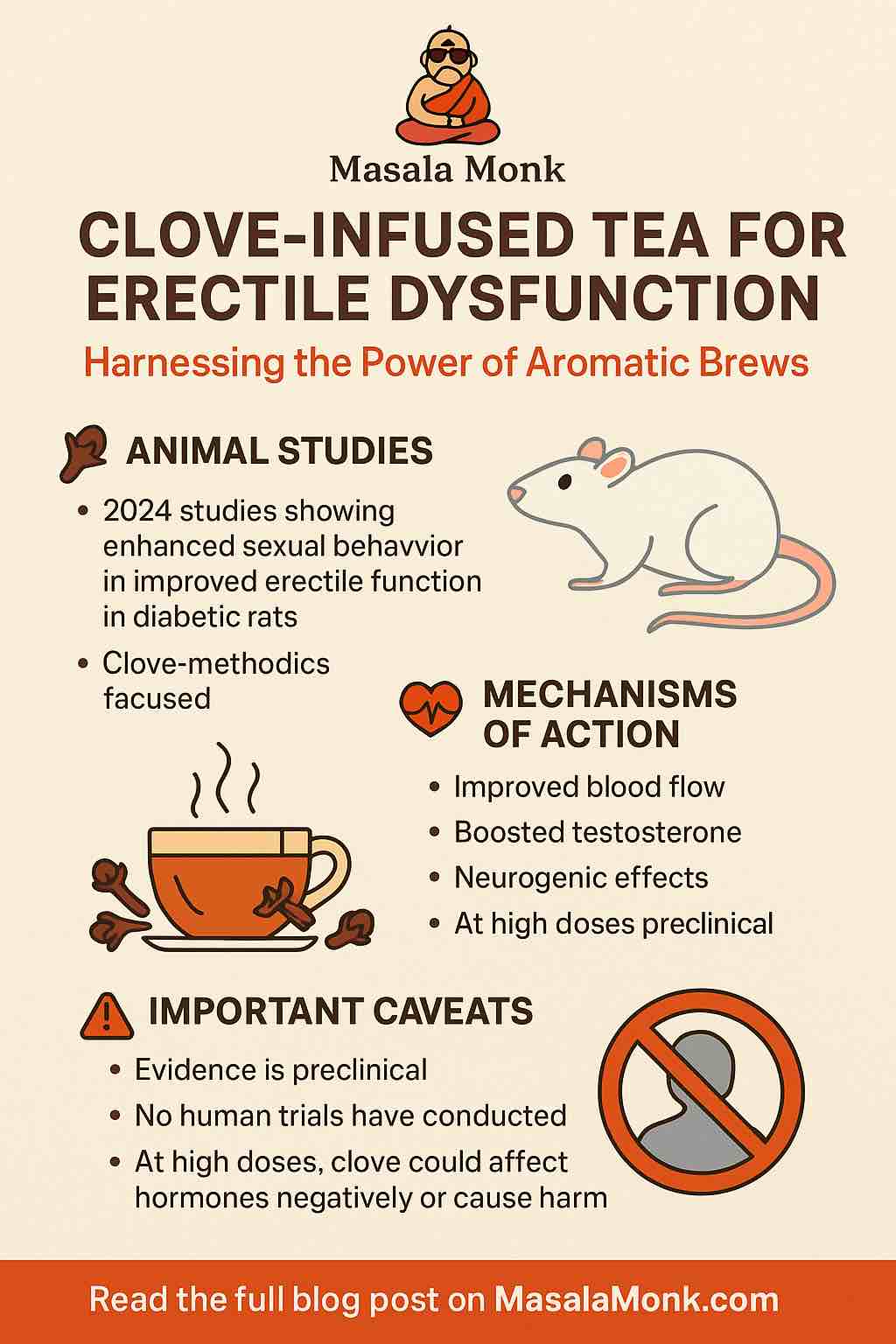
💫 The Spice of Desire
From royal palaces to sacred Ayurvedic texts, saffron has long held the reputation of being more than just a luxurious culinary ingredient. Known as “red gold”, saffron is revered not only for its rich color and intoxicating aroma but also for its sensual, mood-lifting, and aphrodisiac properties.
But is this legendary reputation backed by real science—or just poetic folklore?
In this post, we explore the sensual secrets of saffron, backed by both Ayurvedic wisdom and modern clinical evidence, and show you how to practically incorporate it into your life and love.
🧭 Saffron in History and Ayurveda
In Ayurvedic medicine, saffron (Kumkuma) is classified as tridoshic—it balances all three doshas (Vata, Pitta, and Kapha). It’s traditionally used to:
- Increase vitality and stamina
- Enhance mood and mental clarity
- Deepen intimacy and emotional bonding
- Improve sexual function and fertility
Ancient Persians and Greeks also used saffron in love potions, perfumes, and even in bath rituals to awaken the senses and prepare the body for intimacy.
🧪 What Modern Science Says About Saffron as an Aphrodisiac
❤️ 1. Saffron for Men: Improved Erectile Function
- A 2023 meta-analysis of multiple RCTs concluded that saffron supplementation significantly improved erectile function and sexual satisfaction.
- In one study, 200 mg/day for 10 days improved erection frequency, rigidity, and overall satisfaction (IIEF scores).
- It didn’t raise testosterone—but it did improve how men felt and performed sexually.
Verdict: Saffron supports performance by enhancing blood flow, mood, and confidence—not hormones.
💃 2. Saffron for Women: Desire, Arousal & Satisfaction
- A 6-week study on women taking 15 mg saffron twice daily showed notable improvements in:
- Sexual desire
- Arousal and lubrication
- Satisfaction and pain reduction
- Another RCT found saffron reduced symptoms of sexual dysfunction in women on antidepressants (SSRIs)—a notoriously hard-to-treat issue.
Verdict: Saffron is one of the few natural aphrodisiacs supported by science for both men and women.
💊 3. Saffron for SSRI-Induced Sexual Dysfunction
- In men and women taking SSRIs, saffron helped improve:
- Erectile strength (men)
- Arousal, lubrication, and orgasm (women)
- Results appeared within 4–6 weeks of consistent daily use.
This makes saffron a rare natural aid for medication-related intimacy issues, without the harsh side effects of synthetic drugs.
🧠 4. How Does Saffron Work as an Aphrodisiac?
Saffron isn’t a stimulant—it works more subtly by:
- Enhancing neurotransmitters like serotonin, dopamine, and glutamate
- Improving blood circulation (thanks to crocin and safranal antioxidants)
- Reducing stress and anxiety, which often block libido
- Lifting mood, improving emotional connection and pleasure response
In essence, it creates the perfect internal environment for intimacy to flourish.
📏 Dosage, Safety & How to Use It
| Form | Recommended Dose | Notes |
|---|---|---|
| Threads (whole) | 5–10 threads per day | Soak in warm water or milk before use |
| Extract/Capsule | 30–60 mg/day | Standardized supplements (e.g. 2% safranal) |
| Liquid tincture | Follow label directions | Choose alcohol-free options for bedtime use |
Safety Tips:
- Stick to < 1.5 g/day. Higher doses may cause nausea, dizziness, or uterine stimulation (avoid during pregnancy).
- Look for high-quality, deep-red threads with no yellow styles or additives.
- Pair with milk or healthy fat (like ghee or coconut oil) for better absorption.
🧘 How to Create a Saffron-Infused Bedroom Ritual
🌙 Bedtime Saffron Milk (Golden Love Latte)
Ingredients:
- 1 cup warm milk (dairy or plant-based)
- 5–7 threads saffron (soaked for 20 minutes)
- A pinch of nutmeg
- ½ tsp raw honey
Instructions:
Heat the milk with saffron and nutmeg. Sweeten with honey just before drinking. Sip slowly, preferably with soft lighting and relaxing music nearby.
💆 Saffron-Infused Massage Oil
DIY Blend:
- 3 tbsp almond oil
- 3–5 saffron threads
- Optional: 1 drop cardamom or sandalwood essential oil
Let saffron infuse the oil for 48 hours in a sealed glass jar. Warm slightly before use. Use for sensual massages or aromatic self-care.
💑 Couple’s Ritual: Connection through the Senses
- Share a saffron drink together.
- Light saffron-infused incense or essential oil.
- Engage in eye contact and deep breathing for 2–3 minutes.
- Offer gentle touch or massage with warm oil.
- Let the spice do the rest. 🌿
⚖️ Final Word: Sensuality Backed by Science
Saffron isn’t just ancient romance—it’s modern, evidence-based sensual wellness. Its ability to increase pleasure, improve performance, and deepen emotional connection is backed by:
- Clinical trials
- Real user experiences
- Time-tested traditional practices
Whether you’re struggling with stress-induced libido loss, seeking deeper intimacy, or just want to bring more joy into your relationship, saffron is a luxurious, safe, and meaningful place to start.
🔗 Related Reads:
- Clove-Infused Tea for Erectile Dysfunction: Harnessing the Power of Aromatic Brews
- Tabs Chocolate Review: Does It Really Work?
- Spice It Up in Bedroom – 5 Natural Spices that work as Aphrodisiacs as per Ayurveda
- Is this a Natural Aphrodisiac? Exploring Chamomile Tea and Sexual Wellness
- Understanding the Natural Sexual Benefits of Cloves and Ginger
- Female Vitality with Cardamom: A Spice of Wellness
🔍 FAQs: Saffron as an Aphrodisiac – The Sensual Secrets of Red Gold
1. What makes saffron an aphrodisiac?
Saffron contains compounds like crocin and safranal, which help enhance mood, reduce anxiety, and improve blood flow. These effects combine to create a more receptive state for intimacy and arousal.
2. Is saffron scientifically proven to boost libido?
Yes. Multiple clinical studies show saffron improves libido, sexual satisfaction, and even helps with antidepressant-induced sexual dysfunction in both men and women.
3. How much saffron should I take for sexual wellness?
The effective dose is typically 30–60 mg per day, often split into two doses (e.g. 15 mg morning and evening). For whole threads, this equates to around 5–10 threads daily.
4. How long does it take for saffron to work?
Most people see results in 4 to 6 weeks of consistent daily use. Some report subtle benefits (mood lift or energy) within the first two weeks.
5. Can both men and women use saffron for intimacy?
Absolutely. Saffron has shown benefits for erectile function in men and sexual desire, lubrication, and satisfaction in women, including those experiencing SSRI-related issues.
6. Is saffron safe to take daily?
Yes, saffron is considered safe for daily use at the recommended dosage (under 1.5 g/day). Higher doses may lead to side effects like nausea, dizziness, or uterine stimulation.
7. Can I use saffron during pregnancy or breastfeeding?
High doses should be avoided during pregnancy as saffron may stimulate the uterus. Always consult a healthcare provider if you’re pregnant, nursing, or trying to conceive.
8. How should I consume saffron for best results?
- Soak 5–7 threads in warm milk or water for 15–30 minutes
- Drink as saffron milk (optionally with nutmeg or cardamom)
- Use in teas, tonics, or as part of bedtime rituals
- Capsules or extracts are convenient for consistent dosing
9. Is there a difference between saffron threads and capsules?
Both can be effective. Threads offer a sensory and culinary experience, while capsules provide consistent, measurable dosages. Look for standardized saffron extracts in capsule form (e.g. 2% safranal).
10. Where can I buy high-quality saffron?
Choose saffron that is:
- Deep red (no yellow or white parts)
- From reputable sources like Iran, Kashmir, or Spain
- Stored in airtight, dark glass containers
Avoid cheap or mixed products—authentic saffron is costly but potent.










